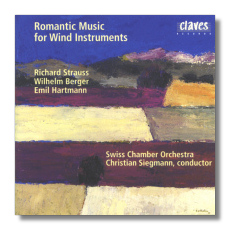
The Internet's Premier Classical Music Source
Related Links
- Latest Reviews
- More Reviews
-
By Composer
-
Collections
DVD & Blu-ray
Books
Concert Reviews
Articles/Interviews
Software
Audio
Search Amazon
Recommended Links
Site News
 CD Review
CD Review
Romantic Wind Music

- Emil Hartmann: Serenade, Op. 43
- Wilhelm Berger: Serenade in F Major, Op. 102
- Richard Strauss: Suite in B Flat Major, Op. 4
Banda Classica/Christian Siegmann
Produced by Günter Appenheimer
Claves CD 50-9409 DDD 68:58
This is an entirely delightful disc, full of the kind of music you want to hear when you come in from a bastard of a day in the office – you've had a fight with the boss, a sizable deal fell through, you forgot to do something really important? This aural balm that will soothe away every worldly care.
The compact disc seems from its earliest days to have been throughly unlightning-like: it strikes everywhere twice. But what is surprising is how areas of the repertoire can go neglected for years, and then suddenly CDs come in from different parts of the sky with exactly the same target. Thus it seems with the Boston-born German composer Wilhelm Berger (1861-1911), who slumbered in obscurity until last year, when Koch Schwann brought out a convincing account of his expansive Variations and Fugue on an Original Theme, Op. 97, coupled with his last work, the Serenade for winds, Op. 102 (3-1072-2 H1), and Dabringhaus und Grimm released his generously proportioned Piano Quintet, Op. 95 (MD&G 3080506-2). The primus motor behind the Berger revival seems to have been Jost Michaels, conductor on the Koch disc, pianist for D&G. Now that same Serenade appears from Christian Siegmann and his Banda Classica on Claves. Michaels turns out to have the more strongly characterised reading, whereas Siegmann makes the music warmer, more human. And it is extremely human music: Berger has something of the harmonic warmth of Brahms (the Variations and Fugue underline more strongly than this easy-going Serenade how much Berger owed to Brahms) without his feeling for form: Brahms knows when to shut up; Berger's amiable discourse doesn't have the same sense of purpose, but is agreeable enough to retain the listener's sympathy.
The Serenade, Op. 43, for winds, cello and double-bass of Emil Hartmann (1836-1898), a member of the eminent Danish family of musicians (he was the great-grandson of Johann Ernst, grandson of August Wilhelm, and son of J. P. E.) reveals complete technical command but less creative individuality, though as with the Berger it is thoroughly enjoyable from beginning to end. And the Suite, Op. 4, of Richard Strauss, first performed in 1884, is an indication of large wings being tested for airworthiness – the closing fugue is a demonstration of the teenage Strauss's technical command. Inspired by the Baroque tradition, Strauss nonetheless far surpasses his models, although Norman Del Mar, in his classic study (Richard Strauss, 1962), is more impressed by the earlier Serenade (which is labelled Op. 7 – Op. 4 acquired its number only on publication in 1911). Del Mar isn't being entirely fair: for such an untried composer this is a very considerable achievement.
Reliable performances; full recorded tone. Recommended.
Copyright © 1996/1998, Martin Anderson


















